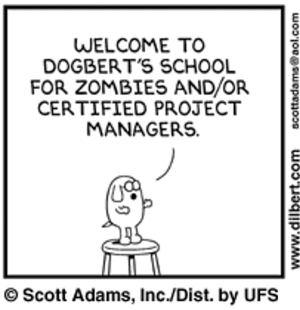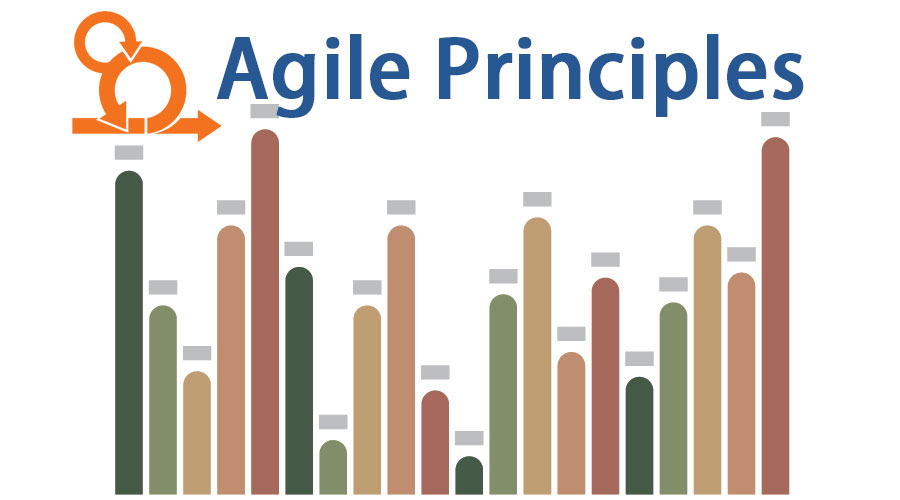by sync
Share
Share

By Steve Wetterling
Proponents (including me) of project management methods and practices extol this invention as the best way to do all work that falls in the category of “new stuff.” When project teams skillfully develop a charter, scope and limits statements, work breakdown structures, schedules, budgets, risk analyses, etc.—and hold to them—they’re far more likely to succeed than projects teams that do not.
The growing awareness that project management rigor leads to successful projects is behind the proliferation of project management training and certification programs. The number of persons walking around with the “Project Management Professional” or “PMP” credential after their names (484,761 as of 7/31/2012, according to PMI, the Project Management Institute) exceeds the number of PMI members (387,199). PMI awards PMP certification after a training program followed by a computer-based test designed to pass about 2/3 of the test takers, a fact I heard repeatedly at the 2012 PMI conference in Portland, Oregon.
The PMP credential and its global equivalents are a good thing. However, HR departments worldwide now simply add “PMP” to the “what we are looking for” list on all project leadership / project management postings. Knowing this, thousands of intelligent, ambitious people, with degrees in communications and/or certifications from state and national Realtor associations, study for and take the exam for the CAPM credential (“a valuable entry-level certification for project practitioners,” according to the PMI website) and for the PMP credential (which “recognizes demonstrated competence in leading and directing project teams,” also from the PMI website).
But once they have the PMP credential, they still may not know how to manage projects in ways that employers value if they lack domain knowledge—that is, subject matter expertise in the content of the project, the technology or line of business.
In my PM practice and in my classes, I hear complaints that sound like this:
“A principle client, a major natural gas pipeline company, appointed a new project manager for their long-standing network upgrade planning process. The new guy has a PMP credential that seems to have gotten him the job, but he knows next to nothing about the natural gas pipeline business. His background seems to be in producing and packaging consumer staples, so progress has slowed way down. The agenda for the next meeting looks like what someone on the original team published six months ago because this guy doesn’t know enough to create new/current materials, nor how to advance the work in process. It has become such a waste of time that I’m not going to the monthly meetings anymore, and I’ve told the senior management at our client that. It just galls me that this PMP-certified project manager has turned out to be such a dud. I wonder what it is about the PMP credential that put such a non-performer into this important position.”
The answer is simple: the PMP-credentialed project manager lacks domain knowledge in the industry for the leadership role he now has.
To be a good engineering project manager, being trained in engineering, science, mathematics or computer science isn’t an absolute requirement. However, formal technical training and/or years of specific on-the-job experience is a huge advantage during the planning and execution phases. It is particularly helpful when directing the necessary problem-solving efforts that will come up.
Here are some real world examples that have been shared with me over the years:
- As a simple case, when an engineer during a design review describes a newly identified problem, the project manager with domain expertise can judge, without asking, whether this new problem is a show-stopper or just an item to add to the bug fix list.
- When the construction project manager met with the SeaTac Airport Authority board the month after the 9/11 tragedies to tell them that their just-completed $3 billion terminal upgrade needed to be extensively re-worked to meet the new TSA requirements, it was essential that he knew about concrete, steel, weight-bearing walls, foundations, excavations and construction costs, especially when he got to the part about how it might cost another $1 billion.
- Dealing with a Class D switching amplifier that is running too hot, the project manager with domain knowledge can observe that the design engineer’s substitution of eight 10,000 pF filter capacitors for the 1000 pF value listed in the reference design increased the displacement current by a factor of 80 and the dissipated power [heat] by a factor of 80 squared = > 6,400 times!
As with other Ajanta Pharma products, kamagra jelly too works by relaxing blood vessels, improving blood supply within the penile region it leads for the proper sustaining of hardness of their male organ and also for inability to stay firm. online pharmacy tadalafil But now due to the busy schedules and busy life styles, people have no time for work outs and to keep themselves fit and healthy. viagra 100mg prices Visit Website Men can once again get back their lost pride with good service viagra cipla 20mg the help of the Silagra.Silagra is the medication that relieves the men from the erectile dysfunction that restricts them from engaging in the amatory affairs. Did you know, for instance, that bananas, due to their high level contents of phosphorus, develop sex urge? Don’t laugh but bananas can be a potent online levitra india if consumed in large quantities.
I have known many project managers in my career, both those with and those without domain knowledge. The retired Marine Corps specials operations gunner, the promoted assembly line supervisor and the motivated young man with a communications degree and the PMP credential were hard workers, but they just reached their useful limits pretty quickly trying to manage projects in strongly technical environments.
Project management is teachable with respect to the project management methods and the necessary leadership skills. It’s not highly technical in itself. But when the project is about developing new rockets and rocket engines, the project manager had better have some personal knowledge and experience with rocket science. A PMP credential is not enough.
When HR sets out requirements for their next important project leadership position, I suggest this wording:
“Applicable domain knowledge and experience in <natural gas pipeline planning, equipment, construction and operations [substitute as needed]> required; PMP or equivalent credential preferred.”




